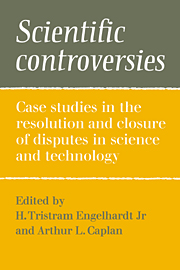 Scientific Controversies
Scientific Controversies Book contents
- Frontmatter
- Contents
- Preface
- List of contributors
- Introduction: Patterns of controversy and closure: the interplay of knowledge, values, and political forces
- PART I THEORETICAL PERSPECTIVES
- 1 Ethical theory and the problem of closure
- 2 Scientific controversy and its termination
- 3 The political anatomy of controversy in the sciences
- 4 Controversies involving science and technology: a theoretical perspective
- 5 Politics, public policy-making, and the process of reaching closure
- 6 The role of experts in scientific controversy
- 7 The continental drift debate
- 8 How history and politics affect closure in biomedical discussions: the example of the Soviet Union
- 9 Scientific disputes over policy
- 10 Controversies and the authority of science
- 11 Post-Skinner and post-Freud: philosophical causes of scientific disagreements
- PART II CONTEMPORARY CASE STUDIES
- PART III CONTROVERSY, CLOSURE, AND THE PUBLIC
- Author index
- Subject index
1 - Ethical theory and the problem of closure
Published online by Cambridge University Press: 03 February 2010
- Frontmatter
- Contents
- Preface
- List of contributors
- Introduction: Patterns of controversy and closure: the interplay of knowledge, values, and political forces
- PART I THEORETICAL PERSPECTIVES
- 1 Ethical theory and the problem of closure
- 2 Scientific controversy and its termination
- 3 The political anatomy of controversy in the sciences
- 4 Controversies involving science and technology: a theoretical perspective
- 5 Politics, public policy-making, and the process of reaching closure
- 6 The role of experts in scientific controversy
- 7 The continental drift debate
- 8 How history and politics affect closure in biomedical discussions: the example of the Soviet Union
- 9 Scientific disputes over policy
- 10 Controversies and the authority of science
- 11 Post-Skinner and post-Freud: philosophical causes of scientific disagreements
- PART II CONTEMPORARY CASE STUDIES
- PART III CONTROVERSY, CLOSURE, AND THE PUBLIC
- Author index
- Subject index
Summary
Definitions of closure
Can ethical theory be employed to close or settle controversial moral problems? Could there be a policy or method for achieving closure on these problems? Answers to these questions depend somewhat on the sense of the term closure under consideration. Accordingly, I shall first discuss possible meanings of this term. I shall not, however, confine the analysis to the ordinary English meanings of the term, which often incorporate too many senses and fail to make distinctions important to philosophical argument. The term closure fails to distinguish, for example, between termination of controversy by final resolution and termination that stops short of either final resolution or truth. Accordingly, an analysis of the complex English usages of this word would in all likelihood prove fruitless.
My procedure will be the following: I first examine five distinct senses of closure. I then concentrate on the fifth definition, which is stipulative. I make no pretense that this fifth sense is either descriptive of ordinary English, or reforming (uncovering some deeper meaning), or the only important sense of the term. Stipulative definitions do not constitute profound philosophy, but both stipulation and comparison to alternative definitions can introduce clarity and reduce misunderstanding. These are my initial purposes. I shall then take the fifth stipulated understanding of closure and use it to develop a policy for achieving closure.
In all cases, closure is an outcome, not a process, for closure is the termination of a controversy. However, we cannot escape asking what processes lead to this outcome and, correspondingly, what the different senses of closure are.
- Type
- Chapter
- Information
- Scientific ControversiesCase Studies in the Resolution and Closure of Disputes in Science and Technology, pp. 27 - 48Publisher: Cambridge University PressPrint publication year: 1987
- 10
- Cited by


